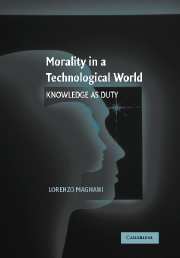Book contents
- Frontmatter
- Contents
- Preface
- 1 Respecting People as Things: Environment
- 2 Treating People as Means: Cloning
- 3 Hybrid People, Hybrid Selves: Artifacts, Consciousness, Free Will
- 4 Knowledge as Duty: Cyberprivacy
- 5 Freedom and Responsibility: Bad Faith
- 6 Creating Ethics: Good Reasons and Good Arguments
- 7 Inferring Reasons: Practical Reasoning, Abduction, Moral Mediators
- Afterword
- References
- Index
Afterword
Published online by Cambridge University Press: 18 July 2009
- Frontmatter
- Contents
- Preface
- 1 Respecting People as Things: Environment
- 2 Treating People as Means: Cloning
- 3 Hybrid People, Hybrid Selves: Artifacts, Consciousness, Free Will
- 4 Knowledge as Duty: Cyberprivacy
- 5 Freedom and Responsibility: Bad Faith
- 6 Creating Ethics: Good Reasons and Good Arguments
- 7 Inferring Reasons: Practical Reasoning, Abduction, Moral Mediators
- Afterword
- References
- Index
Summary
In place of a formal conclusion, I offer here a sort of summary and a few final comments about what I see as the most important elements of Morality in a Technological World. My hope is to have established a compelling rationale for making a serious commitment to new knowledge, both scientific and ethical, for it is only through new knowledge that we can succeed in “respecting people as things” or, for that matter, “treating people as ends.” The new knowledge I passionately endorse will supply us with the moral poise required to handle controversial technology now and in the future. With such knowledge, we will be better prepared to accept rather than fear the new types of hybrid people that will result from technology; ironically, by respecting people as things, we may yet construct Immanuel Kant's shining “kingdom of ends.”
Those who are suspicious of biotechnologies often invoke Kant's dictum that we must not treat people as means, but that maxim alone, here in the increasingly complex twenty-first century, can sometimes seem too simplistic and general to do us much good in the face of cloning and other practices. But we can build on Kant's idea: by inverting his mandate – by encouraging people to treat others as things – we can begin to make peace with inevitable technological advances.
- Type
- Chapter
- Information
- Morality in a Technological WorldKnowledge as Duty, pp. 245 - 250Publisher: Cambridge University PressPrint publication year: 2007



